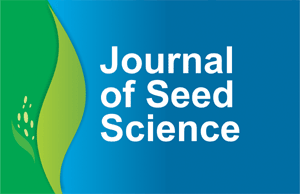Abstract:
Tomato is a crop sensitive to water deficit and the responses of seeds to germination under these conditions involve biochemical, physiological, and molecular processes. The aim of this study was to evaluate the physical, physiological, and biochemical changes in tomato seeds osmoprimed with selenium (Se) and subjected to water deficit during germination. Tomato seeds of the LA 4050 and LA 3475 accessions were osmoprimed with PEG 6000 solution (-1.0 MPa) plus Na2SeO4 (12.5 μM) or only with PEG 6000 solution for 24 h or unprimed. The seeds from the different treatments were subjected to water deficit (-0.3 MPa) or to control (0 MPa). Image analyses were performed (X-ray), physiological variables were obtained by the germination test and activities of SOD, CAT and POX enzymes were determined. Osmopriming, especially with PEG, provided the seeds of both accessions with higher densities and gray mean when compared to unprimed ones. Seeds under water deficit showed lower physiological performance and lower enzymatic activity. Se did not induce seed resistance to water deficit. Osmopriming with PEG 6000 at -1.0 MPa is an efficient technique for improving the physiological quality of seeds of tomato accessions susceptible and tolerant to water deficit. Moreover, the antioxidant enzyme CAT proved to be an indicator of oxidative stress tolerance in tomato seedlings under water deficit.
Index terms:
abiotic stress; enzymatic activity; image analysis; Solanum lycopersicum L.; Solanum pennellii L

 Thumbnail
Thumbnail
 Thumbnail
Thumbnail
 Thumbnail
Thumbnail
 Thumbnail
Thumbnail



